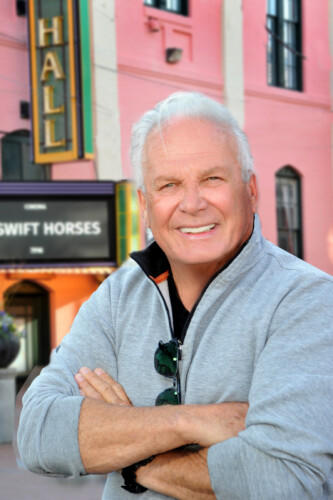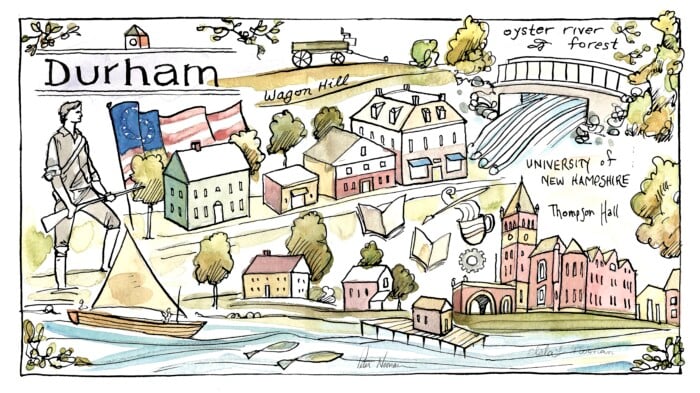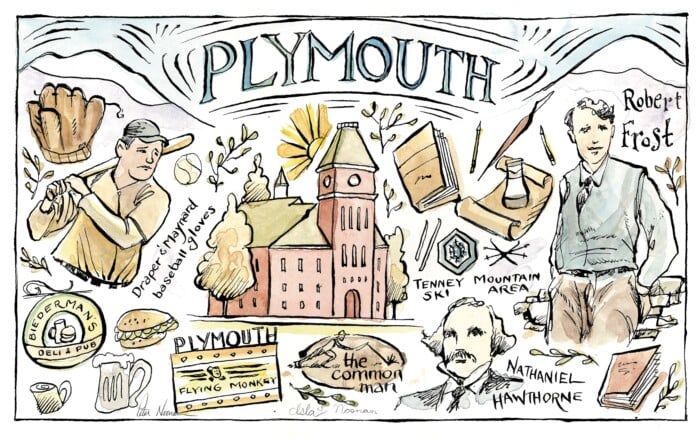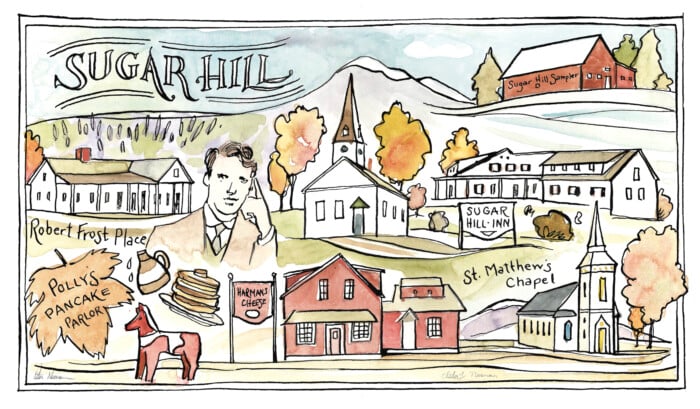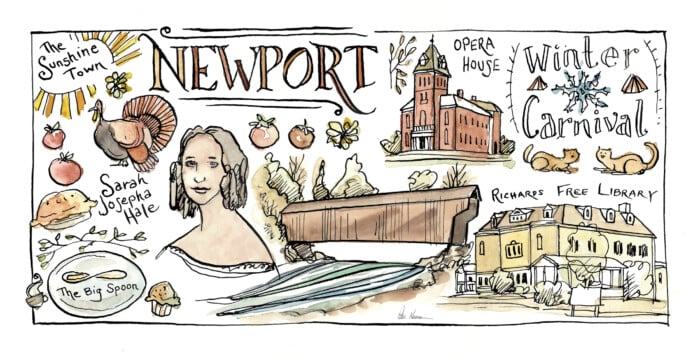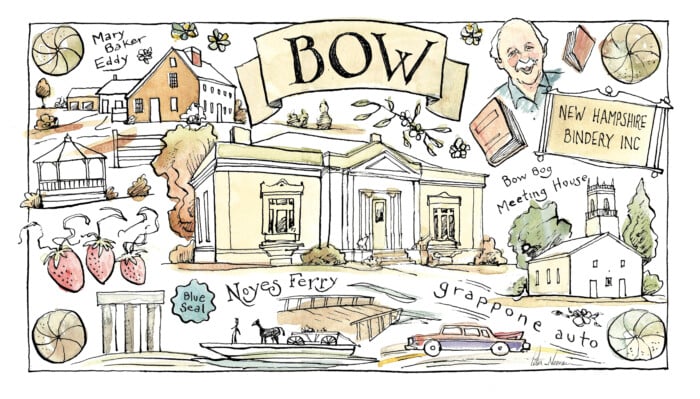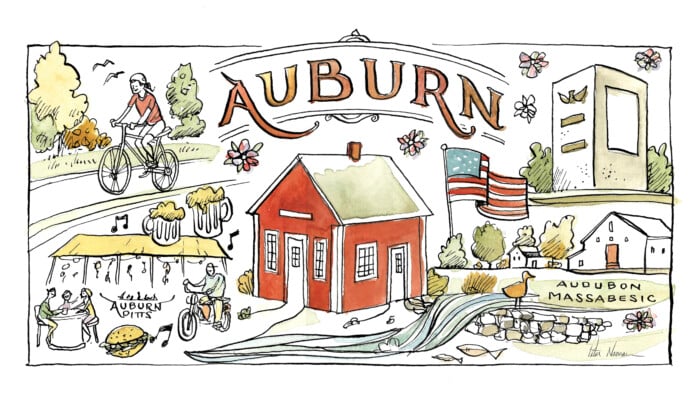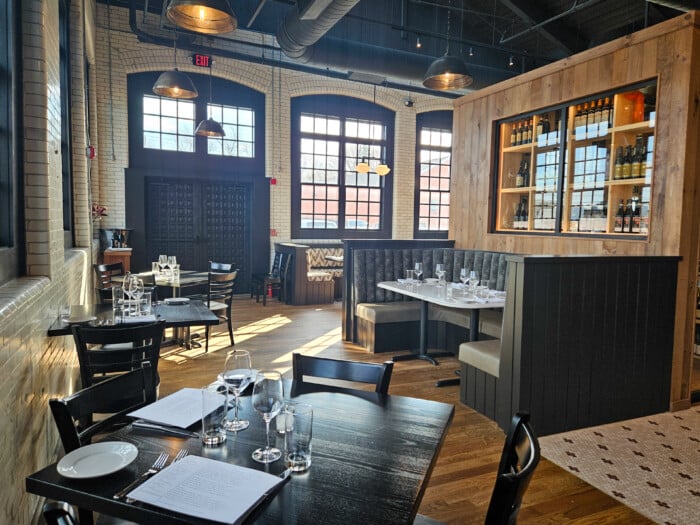Every Street in Portsmouth Tells a Story
Finding home in historic Portsmouth is a process that involves facing unique challenges in an equally unique location
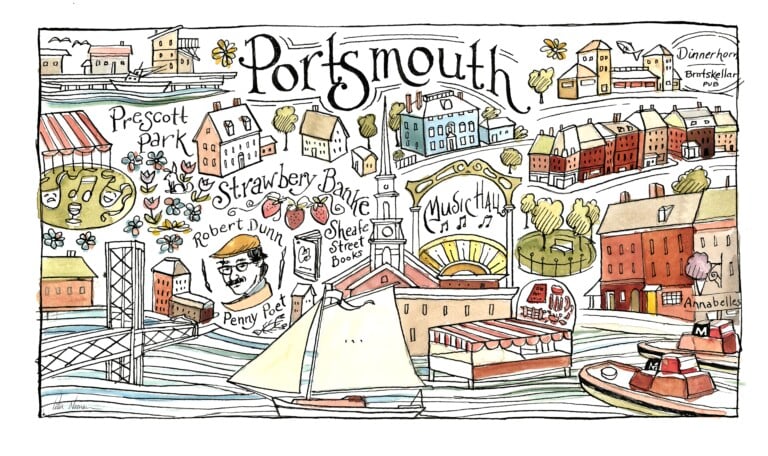
Portsmouth is one of New Hampshire’s most intriguing cities, from Market Square with its iconic North Church and historic façade to the lush gardens of Prescott Park and the sturdy red tugboats tied up on Ceres Street.
A fascinating mix of historic and modern, the city celebrated its 400th birthday in 2023, and many feel the state’s coastal Grande Dame is looking better than ever. Vibrant nightlife, teeming restaurants and a long list of things to do draw people of all ages to Portsmouth, both to visit and to live.
But popularity can come with a price, and locals agree that Portsmouth is facing some challenges. Not enough parking or expensive parking, lack of affordable housing and a need for “real life” services in the downtown are among the most cited concerns, along with dismay over a building boom that has added much taller buildings to the skyline.
The fact that these issues are frequently in the news shows the city is paying attention, but achieving real solutions may take time, especially as Portsmouth continues to grow.
These Streets Are Made for Walkin’
Ask locals what drew them to Portsmouth and why they stay, and you’ll find common themes as well as interesting differences. Sarah Gnerre, 64, and her husband, Chris Mulligan, 58, live on State Street in the older end of town.

Sarah Gnerre and husband Chris Mulligan enjoy a morning walk to the Portsmouth Pier/ Photos by Budd Perry of Memories Studios
Gnerre grew up in the Seacoast, moving to Portsmouth in 1978 after college. She was drawn to the downtown, which was vibrant even then, and a place where “Everybody knew everybody. Portsmouth did and does feel more like a small town than a city. When you are out and about, you’re always meet-ing people.”
Living close to the waterfront, the couple take a daily walk to the Prescott Park Pier
and visit the marker of former Portsmouth Poet Laureate Robert Dunn. “The view is stunning in all seasons and that walk is a nice way to start the day,” Gnerre says.
The couple frequents local galleries and 3S Artspace, as well as shows at The Music Hall and concerts at South Street Church. They enjoy taking their grandchildren to explore Portsmouth’s many parks, both large and small. “There are small parks tucked in unexpected places, so you have that sense of discovery,” Gnerre says.
She and her husband walk nearly everywhere, keeping just one car for his work and errands that need to be done outside of downtown. Like many, her Portsmouth wish list includes a grocery and pharmacy.
“There are some nice markets, including the seasonal farmers’ market, but to truly support a residential downtown you need real-life services,” she says. “Even full-
service banking is getting challenging as some banks now only offer ATMs.” Still, Gnerre and her husband would not live anywhere else. “We have an amazing life, with all kinds of activities right at our doorstep.”
Jeffrey Barnes and his fiancé, Emily McKenna, both 25, feel fortunate to have found an apartment over a garage off Dennett Street, an easy walk from the downtown, and once part of Portsmouth’s North End. In the 1960s, this area was Little Italy, a dynamic neighborhood of older homes, bakeries, markets, shops and its own school.
The neighborhood was wiped out when urban renewal swept through — an action that remains controversial. Four hundred buildings, including 200 homes, were bulldozed, their families displaced. New development would not materialize for decades, and former residents saw much of their thriving neighborhood replaced by parking lots and
a strip mall.
Today, part of the North End contains hotels and large buildings offering office and restaurant space and luxury condos. A remnant of the Italian neighborhood lives on in a cluster of buildings that were saved and moved to a small complex called The Hill, now largely home to offices.
Barnes and McKenna live near North Mill Pond, with Barnes a Portsmouth native and McKenna hailing from Rye. They love being able to walk downtown and frequently meet friends for dinner or drinks on the decks. Favorite restaurants include TJ’s Sports Bar, The Goat and breakfast at Café Espresso, or for a special night out, Puddle Dock down in the South End.
“We love walking around, in any season,” Barnes says. “There’s always something going on, something to see, and we like to take our time and explore.”
The couple frequents shows at Seacoast Repertory Theatre and the live theater and summer movies at Prescott Park. “They have a huge inflatable screen, and it’s awesome. Seeing “Jaws” on a screen like that was incredible,” Barnes says.
The couple wants to make Portsmouth their forever home, but knows this will be a challenge. “We lucked out getting this apartment,” McKenna says. “To find a house that we can afford will be tough, but we are hopeful.”
Like Barnes and McKenna, Budd Perry and his wife, Debra Sue, also live in the North End, but in the Cutts Mansion area. Now in their 60s, they too, walk everywhere. Perry grew up in Exeter but moved to Portsmouth more than 30 years ago when he married Debra Sue, a Portsmouth native.
“We’ve raised our kids here, grandkids here; it’s a great town,” he says. His favorite part? “Eating!” he says with a grin. “So it’s good we do lots of walking. Really, you can find any kind of food at almost any time of day. I love downtown, but my favorite restaurant is the Dinnerhorn, out on Route 1. It’s family-owned, an old-time Portsmouth standby. That’s where all the locals go on Friday night. You can’t beat it.”
Perry, who is also a musician, loves to take in shows at The Music Hall, and at Jimmy’s Jazz & Blues Club, which features a range of musical performances accompanied by dinner and drinks; there is also a jazz brunch. In fact, the music scene is alive and well in Portsmouth, with concerts at Prescott Park, several restaurants offering live music, and musicians busking in the Square.
Perry sees the city’s biggest issue as the lack of affordable housing. “The downtown especially is less an option for the middle class. Workforce housing was supposedly going in on Route 1, but it turned into luxury condos. We need places for people to live who are doing the work, raising families, starting out. A city needs all demographics to thrive.”
Food, Glorious Food
Long-time residents like Perry are still somewhat surprised by how their city has evolved. As recently as the 1970s, Portsmouth was a working man’s town. The waterfront sported numerous bars, not trendy shops and eateries. The downtown focused on daily life with hardware stores, department stores like J.J. Newberry’s and Grants, pharmacies and banks.
Locals frequented Gilley’s Diner (named for Robert “Gilley” Gilbert) which was towed into Market Square every evening and offered burgers, dogs and baked beans. Men in suits stood next to dock workers and mechanics as they waited for their food.
Gilbert was ticketed 50 cents a day for parking illegally; he paid the tab then did the same thing the next day. Gilbert operated the dog cart for four decades; when he retired, the city celebrated with Gilley’s Day, complete with parade. You can still get a great hot dog at Gilley’s, albeit with new owners, and now permanently parked on Fleet Street.
Back in 1901, Frank Jones, the brewery baron and a major Portsmouth philanthropist, undertook the first renovation of The Music Hall as a way to bring culture to both Portsmouth and the region. Stunning in its architecture and design, complete with ceiling murals and gilded balconies, the venue was a showplace that attracted attendees from miles around.
Two World Wars, time and economics led to the incredible venue falling into disrepair. Murals were painted over; gilding and plasterwork forgotten. It became an inexpensive sticky-floored movie theater that showed largely Disney movies and had a trash can lid with a bulb where the once gorgeous crystal chandelier once hung.

Jeffrey Barnes and fiancé Emily McKenna love hitting the decks on Portsmouth’s waterfront/ Photos by Budd Perry of Memories Studios
Then, in the late 1980s, a team of visionaries (the Friends of The Music Hall) began the daunting task of restoring the 1878 building to its former glory, and renewing Jones’ vision of it as a cultural center for people far and near. Today, it is once again a theatrical jewel, its grandeur revived and its place secure in the heart of the city.
Portsmouth’s reputation is interwoven with food due to its legendary restaurant scene. The city peaked with 326 restau-rants in 2018, and now boasts 301, with 75 located downtown. According to a Seacoastonline article, the city has 36,000 restaurant seats — more than enough for its 22,000 residents. The restaurant renaissance began in the 1970s with the debut of The Oar House, the Dolphin Striker, The Library and The Rusty Hammer.
With the success of these venues, shops, nightlife and culture followed, and Portsmouth’s transformation began. Today, all of these restaurants survive, save for the Dolphin Striker, which closed in 2021 after 47 years. A new eatery is opening there
this year.
Families gravitate to Portsmouth as well, with Portsmouth natives Christy Bryant, 33, and her husband, Tylor, 31, both choosing to raise their boys, ages 10 and 4, in the city. The Bryants live in the Sherburne neighborhood, west of downtown. It’s a close-knit community where kids ride their bikes in the streets and play in each other’s yards.
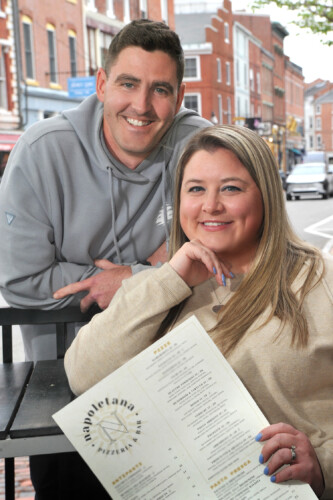
Christy and Tylor Bryant grab a slice of pizza at one of the city’s many eateries/ Photos by Budd Perry of Memories Studios
“We grew up here and our families are here, so that’s a big draw,” Tylor says. “We also like the city’s proximity to beaches and lakes, as well as all the downtown has to offer.” Both boys love the city’s many playgrounds, as well as Peirce Island and Prescott Park, and hitting favorite ice cream spots.
The Bryants know they were lucky to find their house when they did. “We bought it in 2016, and it’s small — I can’t have another child; there isn’t room,” she says with a laugh. “And I’m only half joking. We have friends who want to live here and can’t find anything.”
Christy is also concerned about what she sees as a “touch of Boston” in the downtown. “Portsmouth has such lovely, historic buildings. It’s too bad to see these big, tall buildings coming in. It’s really changing the skyline.”
Still, she has no plans to leave. “I loved growing up here, and I want my boys to have that chance. There is still great community here.”
Portsmouth is clearly a city with tremendous appeal but also one seeking to blend its identities. No matter how gentrified it may appear, it still has a working person’s soul.
Those that remember its rowdier waterfront, ethnic neighborhoods and suppers of beans and dogs served up in the Square speak fondly of those rough edges, if only as a reminder of the city’s roots. Hopefully, Portsmouth can bridge both worlds going forward — an elegant lady with the heart of a classy dame.
